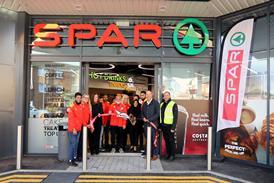Typical. You wait years for an OFT decision and then three come along at once.
The Office of Fair Trading's trio of investigations into the distribution of newspapers and magazines have crawled along with all the vigour of gridlocked London buses, but their delayed arrival - promised for late summer, they turned up as the clocks went back - offer one or two faint glimmers of hope for small news retailers.
The OFT won't be recommending that news distribution is referred to the Competition Commission. No surprise there; in fact, even the retailer lobby groups couldn't agree on whether that would be desirable or not.
Under the Enterprise Act 2002, the OFT has the power to make a reference to the Competition Commission if it has reasonable grounds for suspecting that any feature of a market is anti-competitive. Despite deciding that "certain features of the sector meet the statutory test for reference" the OFT feels that "positive market developments" could come about from parties applying its guidance in their self-assessment.
So it falls to the publishers, distributors and wholesalers to take a look at their arrangements and decide for themselves whether or not they offer the consumer a fair deal.
If that sounds like letting hedge fund managers choose the size of their Christmas bonus, there's a crumb of comfort in the OFT's definition of 'consumer' as "customers of the parties to the agreement and subsequent purchasers" - which suggests they'll have to prove they are giving retailers a fair cut of the spoils. The regulator says it will have another look at the market in a year's time.
As John Lennon of the Association of News Retailing, which represents the news interests of Association of Convenience Stores members, points out: "The changes that will undoubtedly take place as a response to this report could create a substantial change in the market, making any market review at this stage too complicated."
There's also no immediate prospect of change in the wholesalers' Absolute Territorial Protection (ATP) for newspaper distribution. It's these restrictions which prevent retailers looking elsewhere for supplies if charges rise or they get poor service, but the OFT believes that the public is better served if newspaper supply continues to be excluded from competition law.
That's enough to set the Champagne corks flying in the newspaper head offices, with Tim Brooks, chairman of the Newspaper Publishers Association, crowing that it "will help underpin current and future distribution arrangements for newspapers to the benefit of all our readers throughout the UK". Retailers will just have to like it or leave; chances are some will choose the second option.
But here's a little ray of sunshine. "A key difference between newspapers and magazines is that magazine sales aren't subject to the same extreme time sensitivity as newspapers," says the report. "This means there may be greater scope for competition to develop in the distribution of magazines in the absence of ATP."
In other words, you may one day be able to choose where you get your magazines from - even, perhaps, from your local cash & carry. The OFT is well aware that c-store retailers work every day with openly-competitive supply chains and even goes as far as to suggest that "retailers' experience may reveal innovation opportunities that magazine publishers would not be aware of".
Publishers and wholesalers don't like the sound of that at all, with the PPA's Ian Locks pointing out that as newspapers and mags are delivered in the same van, it would be uneconomic to separate them.
The PPA suggests abandoning ATP would put wholesalers' costs up by 25% - a rise they would pass on to retailers. "Undermining the economics of current contracts, as allowing selling across territories for magazines would do, risks the loss of universal service for both newspapers and magazines, as well as potential price rises for newspapers and a future blight on investment in the industry," it says. "Like trying to detach a Siamese twin, in trying to separate one you run the very real risk of doing serious harm, or even killing both."
Economist Professor Paul Dobson of Loughborough University also sees no good coming of the move. "If small retailers sought to obtain supplies in an open competition system they would have no buyer power whatsoever in respect of obtaining competitive terms," he says. "Instead, all the beneficial terms would simply go to multiple retailers. The result is likely to be thousands of small retailers exiting the market."
That view doesn't take into account the ingenuity of independent retailers, who could group together as a not-for-profit co-operative paying a single carriage charge, or become a sub-wholesaler to provide supplies to others.
Those with more than one store in the same area could have all their magazines delivered to one location, saving on carriage charges, and symbol groups would almost certainly make their own supply arrangements.
So what else might change? The OFT has looked at the 14-year-old National Newspaper Code of Practice and decided it's time to release wholesalers and publishers from some of its requirements. The regulator is aware that all parties, including retailers, have been working towards a new Code and is minded to let them get on with it.
One recommendation is that the Minimum Entry Level (MEL) obligation for wholesalers to supply all retailers who agree to a minimum weekly charge, should be removed. This is a legacy of the 1994 Code, which was drawn up amid concerns that wholesalers would refuse to supply new retail outlets in areas they believed were already adequately served.
Now the suggestion is that the rise in carriage charges - they now cover 75% of wholesalers' distribution costs - means that wholesalers have a good enough commercial incentive to supply new retail outlets.
Says John Lennon: "We need to further understand the ramifications of the removal of MEL. In the guidance the OFT has made a universal supply obligation an important part of the publishers' assessment of the likely anti-competitive impact of their contracts with wholesalers. Without some form of universal supply obligation the contracts could well be illegal. We wait to see some indication from newspaper publishers' on how they will satisfy this important requirement."
The OFT guidance - and that, for now, is all it is - has been presented to the Secretary of State for Business, Lord Mandelson, who has called for consultation on the Code recommendation. Parties have until January 14 next year to present their views.
Progress? It's too soon to say. But at least the bus is crawling forward again.
The Office of Fair Trading's trio of investigations into the distribution of newspapers and magazines have crawled along with all the vigour of gridlocked London buses, but their delayed arrival - promised for late summer, they turned up as the clocks went back - offer one or two faint glimmers of hope for small news retailers.
The OFT won't be recommending that news distribution is referred to the Competition Commission. No surprise there; in fact, even the retailer lobby groups couldn't agree on whether that would be desirable or not.
Under the Enterprise Act 2002, the OFT has the power to make a reference to the Competition Commission if it has reasonable grounds for suspecting that any feature of a market is anti-competitive. Despite deciding that "certain features of the sector meet the statutory test for reference" the OFT feels that "positive market developments" could come about from parties applying its guidance in their self-assessment.
So it falls to the publishers, distributors and wholesalers to take a look at their arrangements and decide for themselves whether or not they offer the consumer a fair deal.
If that sounds like letting hedge fund managers choose the size of their Christmas bonus, there's a crumb of comfort in the OFT's definition of 'consumer' as "customers of the parties to the agreement and subsequent purchasers" - which suggests they'll have to prove they are giving retailers a fair cut of the spoils. The regulator says it will have another look at the market in a year's time.
As John Lennon of the Association of News Retailing, which represents the news interests of Association of Convenience Stores members, points out: "The changes that will undoubtedly take place as a response to this report could create a substantial change in the market, making any market review at this stage too complicated."
There's also no immediate prospect of change in the wholesalers' Absolute Territorial Protection (ATP) for newspaper distribution. It's these restrictions which prevent retailers looking elsewhere for supplies if charges rise or they get poor service, but the OFT believes that the public is better served if newspaper supply continues to be excluded from competition law.
That's enough to set the Champagne corks flying in the newspaper head offices, with Tim Brooks, chairman of the Newspaper Publishers Association, crowing that it "will help underpin current and future distribution arrangements for newspapers to the benefit of all our readers throughout the UK". Retailers will just have to like it or leave; chances are some will choose the second option.
But here's a little ray of sunshine. "A key difference between newspapers and magazines is that magazine sales aren't subject to the same extreme time sensitivity as newspapers," says the report. "This means there may be greater scope for competition to develop in the distribution of magazines in the absence of ATP."
In other words, you may one day be able to choose where you get your magazines from - even, perhaps, from your local cash & carry. The OFT is well aware that c-store retailers work every day with openly-competitive supply chains and even goes as far as to suggest that "retailers' experience may reveal innovation opportunities that magazine publishers would not be aware of".
Publishers and wholesalers don't like the sound of that at all, with the PPA's Ian Locks pointing out that as newspapers and mags are delivered in the same van, it would be uneconomic to separate them.
The PPA suggests abandoning ATP would put wholesalers' costs up by 25% - a rise they would pass on to retailers. "Undermining the economics of current contracts, as allowing selling across territories for magazines would do, risks the loss of universal service for both newspapers and magazines, as well as potential price rises for newspapers and a future blight on investment in the industry," it says. "Like trying to detach a Siamese twin, in trying to separate one you run the very real risk of doing serious harm, or even killing both."
Economist Professor Paul Dobson of Loughborough University also sees no good coming of the move. "If small retailers sought to obtain supplies in an open competition system they would have no buyer power whatsoever in respect of obtaining competitive terms," he says. "Instead, all the beneficial terms would simply go to multiple retailers. The result is likely to be thousands of small retailers exiting the market."
That view doesn't take into account the ingenuity of independent retailers, who could group together as a not-for-profit co-operative paying a single carriage charge, or become a sub-wholesaler to provide supplies to others.
Those with more than one store in the same area could have all their magazines delivered to one location, saving on carriage charges, and symbol groups would almost certainly make their own supply arrangements.
So what else might change? The OFT has looked at the 14-year-old National Newspaper Code of Practice and decided it's time to release wholesalers and publishers from some of its requirements. The regulator is aware that all parties, including retailers, have been working towards a new Code and is minded to let them get on with it.
One recommendation is that the Minimum Entry Level (MEL) obligation for wholesalers to supply all retailers who agree to a minimum weekly charge, should be removed. This is a legacy of the 1994 Code, which was drawn up amid concerns that wholesalers would refuse to supply new retail outlets in areas they believed were already adequately served.
Now the suggestion is that the rise in carriage charges - they now cover 75% of wholesalers' distribution costs - means that wholesalers have a good enough commercial incentive to supply new retail outlets.
Says John Lennon: "We need to further understand the ramifications of the removal of MEL. In the guidance the OFT has made a universal supply obligation an important part of the publishers' assessment of the likely anti-competitive impact of their contracts with wholesalers. Without some form of universal supply obligation the contracts could well be illegal. We wait to see some indication from newspaper publishers' on how they will satisfy this important requirement."
The OFT guidance - and that, for now, is all it is - has been presented to the Secretary of State for Business, Lord Mandelson, who has called for consultation on the Code recommendation. Parties have until January 14 next year to present their views.
Progress? It's too soon to say. But at least the bus is crawling forward again.

















No comments yet